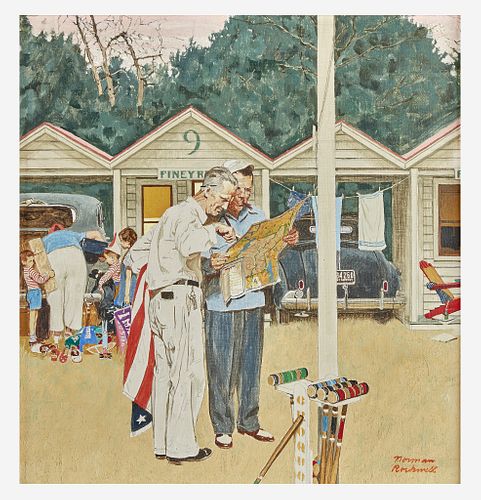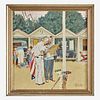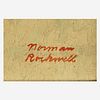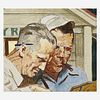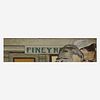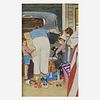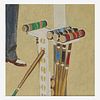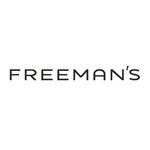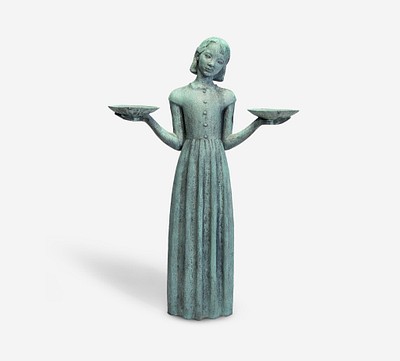Norman Rockwell (American, 1894–1978) Piney Rest Motel (Cozy Rest Motel)
About Seller
2400 Market St
Philadelphia, PA 19147
United States
Established in 1805, Freeman’s Auction House holds tradition close, with a progressive mind-set towards marketing and promotion, along with access to a team of top experts in the auction business. And now with offices in New England, the Southeast, and on the West Coast, it has never been easier to ...Read more
Two ways to bid:
- Leave a max absentee bid and the platform will bid on your behalf up to your maximum bid during the live auction.
- Bid live during the auction and your bids will be submitted real-time to the auctioneer.
Bid Increments
| Price | Bid Increment |
|---|---|
| $0 | $25 |
| $500 | $50 |
| $1,000 | $100 |
| $2,000 | $200 |
| $3,000 | $250 |
| $5,000 | $500 |
| $10,000 | $1,000 |
| $20,000 | $2,000 |
| $30,000 | $2,500 |
| $50,000 | $5,000 |
| $100,000 | $10,000 |
About Auction
Jun 6, 2021
Freeman’s is pleased to present Sylvia Shaw Judson’s Bird Girl, the highlight of the June 6 auction. In addition to the sculpture, this auction will also feature several notable works by significant American artists, including Daniel Garber, Norman Rockwell, Edward Redfield, and William Harnett. Freeman's info@freemansauction.com
- Lot Description
Norman Rockwell (American, 1894–1978) Piney Rest Motel (Cozy Rest Motel)
Signed 'Norman/Rockwell' bottom right, oil and pencil on canvas
18 x 17 in. (45.7 x 43.2cm)
Executed circa 1950.Provenance
The Artist.
Acquired directly from the Studio of the above, Maine.
Private Collection, Maine.
By descent in the family.
Private Collection, New Jersey.
Footnote:Literature
Norman Rockwell, “Making the Color Sketch” in Rockwell on Rockwell: How I Make a Picture, Watson-Guptil Publications, New York, 1970, p. 165 (for an illustration of the entire series).
Note
Norman Rockwell is perhaps best remembered for his historic involvement with The Saturday Evening Post, a famous Philadelphia-based magazine, for which he painted an impressive 321 cover illustrations. Aside from this, Rockwell also illustrated calendars, and was commissioned to paint a significant number of advertisements for major American companies including Coca-Cola, Jell-O, Sun-Maid Raisins, and Western Union.
Painted in the 1950s and directly gifted by Rockwell to the family of the present owner, Piny Rest Motel was probably intended for a Saturday Evening Post cover. Ultimately however, it was used as an advertisement for a Famous Artists School's promotional poster. Created by Albert Dorne at the onset of World War II in 1948, the Famous Artists School (FAS) was once the leading business in the city of Wesport, Connecticut. At the time, self-improvement courses completed at home became increasingly popular, and the school aimed at providing a series of specific art courses by correspondance to aspiring commercial artists across the United States who wished to convert their technical skills into careers. Dorne capitalized on Rockwell's fame ("The World's Most Famous Cover Artist") and hired him as an instructor. Over the years, Rockwell designed nationwide campaign posters in order to promote the school, and recruit new students. The School rapidly became successful, but needed to be remodeled after it became evident that students were only interested in taking Rockwell's course, and neglected the other founders' curriculum.
The present work appears to be a pivotal version of an intensely researched subject, which Rockwell explored and diversified via numerous color sketches before eventually settling on "the correct solution." The scene take places in the early hours of the morning at a motel, Cozy Rest or Piney Rest according to the many versions, and shows a family about to depart. While the mother and children are shown packing the car in the background, the patriarch is asking for directions from the manager of the complex in the foreground. The work follows several small color sketches that established the general color scheme, the tonal relationship, as well as the composition of the scene. It also predates the last studies Rockwell did, which focus on the two main characters in the foreground. Here, Rockwell dots the scene with important details and props that convey the atmosphere of a tourist camp, such as the croquet mallets in the foreground, or the colorful flags the father holds in his hand - an uncanny and heartwarming depiction of the quintessential, simple American family dream that Rockwell sought to capture throughout his long career, and on which the model of the Famous Artists School was built. As the artist stated himself: "I was showing the America I knew and observed to others who might not have noticed. And perhaps, therefore, this is one function of the illustrator. He can show what has become so familiar that it is no longer noticed. The illustrator thus becomes a chronicler of his time."
Condition report:The unlined canvas in excellent original condition, without any sign of restoration as seen under UV light. The back of the work is dusty and would benefit from a light brushing.
Frame: 20 1/2 x 19 1/2 x 1 1/2 in. - Shipping Info
-
No lot may be removed from Freeman’s premises until the buyer has paid in full the purchase price therefor including Buyer’s Premium or has satisfied such terms that Freeman’s, in its sole discretion, shall require. Subject to the foregoing, all Property shall be paid for and removed by the buyer at his/ her expense within ten (10) days of sale and, if not so removed, may be sold by Freeman’s, or sent by Freeman’s to a third-party storage facility, at the sole risk and charge of the buyer(s), and Freeman’s may prohibit the buyer from participating, directly or indirectly, as a bidder or buyer in any future sale or sales. In addition to other remedies available to Freeman’s by law, Freeman’s reserves the right to impose a late charge of 1.5% per month of the total purchase price on any balance remaining ten (10) days after the day of sale. If Property is not removed by the buyer within ten (10) days, a handling charge of 2% of the total purchase price per month from the tenth day after the sale until removal by the buyer shall be payable to Freeman’s by the buyer. Freeman’s will not be responsible for any loss, damage, theft, or otherwise responsible for any goods left in Freeman’s possession after ten (10) days. If the foregoing conditions or any applicable provisions of law are not complied with, in addition to other remedies available to Freeman’s and the Consignor (including without limitation the right to hold the buyer(s) liable for the bid price) Freeman’s, at its option, may either cancel the sale, retaining as liquidated damages all payments made by the buyer(s), or resell the property. In such event, the buyer(s) shall remain liable for any deficiency in the original purchase price and will also be responsible for all costs, including warehousing, the expense of the ultimate sale, and Freeman’s commission at its regular rates together with all related and incidental charges, including legal fees. Payment is a precondition to removal. Payment shall be by cash, certified check or similar bank draft, or any other method approved by Freeman’s. Checks will not be deemed to constitute payment until cleared. Any exceptions must be made upon Freeman’s written approval of credit prior to sale. In addition, a defaulting buyer will be deemed to have granted and assigned to Freeman’s, a continuing security interest of first priority in any property or money of, or owing to such buyer in Freeman’ possession, and Freeman’s may retain and apply such property or money as collateral security for the obligations due to Freeman’s. Freeman’s shall have all of the rights accorded a secured party under the Pennsylvania Uniform Commercial Code.
-
- Buyer's Premium



 EUR
EUR CAD
CAD AUD
AUD GBP
GBP MXN
MXN HKD
HKD CNY
CNY MYR
MYR SEK
SEK SGD
SGD CHF
CHF THB
THB